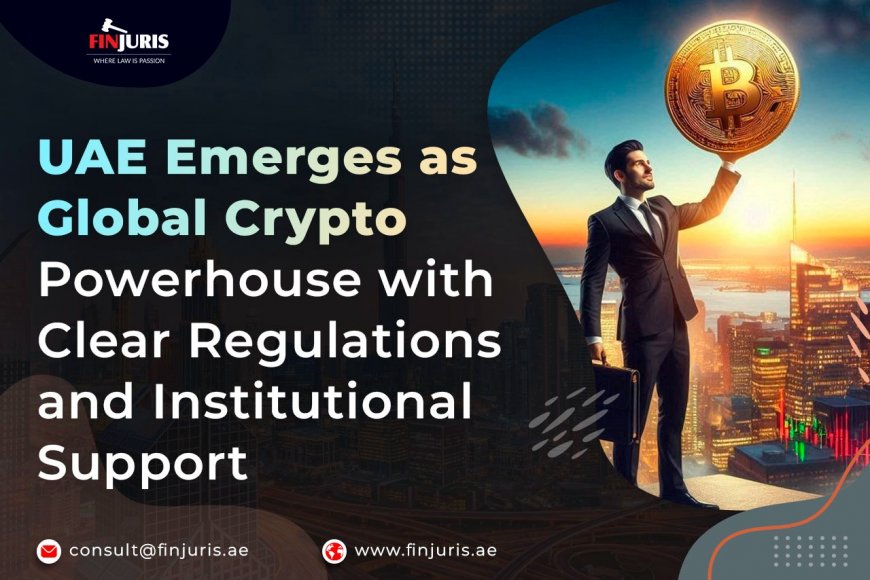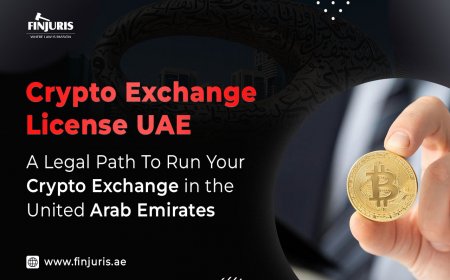UAE Emerges as Global Crypto Powerhouse with Clear Regulations and Institutional Support
UAE rises as a global crypto hub with clear regulations, strong institutional support, and a thriving blockchain ecosystem.

In just a few short years, the United Arab Emirates (UAE) has undergone a remarkable transformation from a regional trading hub into a global center for cryptocurrency and blockchain innovation. Armed with regulatory clarity, institutional backing, and visionary leadership, the UAE now stands as one of the most attractive jurisdictions worldwide for digital-asset firms, investors, and entrepreneurs.
The UAE’s rise is not a matter of chance. Instead, it is the result of carefully designed strategies that combine business-friendly policies, world-class infrastructure, and a forward-looking approach to financial innovation. As the global crypto economy continues to expand, the UAE has emerged as both a magnet for capital and a proving ground for the future of digital finance.
From Ambition to Action: The UAE’s Crypto Journey
When most nations were still wrestling with whether to regulate or ban crypto assets, the UAE chose a different path: engagement and clarity. Rather than stifle innovation, policymakers set out to build an environment where responsible crypto adoption could flourish.
This proactive stance has paid off. Today, crypto companies from across the globe are relocating to Dubai, Abu Dhabi, and Ras Al Khaimah, taking advantage of flexible regulations, tax incentives, and access to international markets.
Regulatory Foundations: VARA, ADGM & Purpose-Built Frameworks
At the core of the UAE’s success is its strong regulatory foundation. Dubai’s Virtual Assets Regulatory Authority (VARA) and Abu Dhabi’s ADGM (Abu Dhabi Global Market) were established to provide clarity for an industry often characterized by uncertainty elsewhere.
Unlike the patchwork rules in countries such as the United States, where overlapping agencies create confusion, the UAE’s regulators provide specialized frameworks that define what is allowed, who can operate, and how compliance should be achieved. This certainty gives investors and institutions the confidence to participate at scale.
For example:
- Crypto exchanges can apply for licenses that detail clear requirements for custody, reporting, and customer protection.
- Custodians and lenders receive defined operational guidelines.
- Tokenization projects have regulatory recognition, opening the door for real-world assets like real estate or commodities to be represented on blockchain platforms.
By aligning with the OECD’s Crypto-Asset Reporting Framework (CARF), the UAE is also signaling its willingness to cooperate internationally on tax transparency, a strategic move that reassures institutional players wary of reputational risks.
Read More: Crypto License in Dubai: Everything You Need to Know in 2025
Surging Capital, Inflows & Institutional Momentum
The impact of these policies is reflected in capital flows. Between July 2023 and June 2024, the UAE recorded USD 34 billion in crypto inflows, marking a 42% increase compared with the prior year. Importantly, these flows are no longer dominated by speculative retail activity. A staggering 93% of volumes now come from institutions, underscoring the maturity of the market.
High-profile institutional moves include:
- Abu Dhabi’s MGX investing USD 2 billion in Binance, strengthening ties with one of the world’s largest exchanges.
- Standard Chartered launching licensed custody services for digital assets in the UAE, offering secure infrastructure to institutional clients.
- Ripple obtaining a license from the Dubai Financial Services Authority (DFSA), enabling it to operate within the DIFC financial free zone.
- Crypto derivatives platform GFO-X receiving approval in Abu Dhabi to run a regulated exchange and clearinghouse.
These moves demonstrate that global heavyweights in banking, payments, and digital assets now view the UAE as a serious and credible hub for operations.
Building a Complete Crypto Ecosystem
Beyond regulation and capital inflows, the UAE is actively building a complete ecosystem for digital assets and blockchain innovation.
Free Zones as Innovation Clusters
The Dubai Multi Commodities Centre (DMCC) has launched the Crypto Centre, home to hundreds of blockchain companies. Similarly, the RAK Digital Assets Oasis in Ras Al Khaimah offers streamlined licensing for Web3 startups. These zones provide more than office space, they act as accelerators, offering networking, legal guidance, and access to venture capital.
Adoption Among Citizens
Adoption is not limited to institutions. Studies show that 74% of UAE residents aged 25–34 are engaged with crypto, and the nation already hosts over half a million daily traders. For a country with a relatively small population, this level of grassroots involvement is extraordinary.
Blockchain and Web3 Initiatives
The UAE is also pushing into adjacent areas like tokenization and Web3. Abu Dhabi’s ADGM has approved frameworks for decentralized finance (DeFi) activities such as lending and staking. Dubai has floated the idea of a dirham-backed stablecoin, while tokenized real estate projects are gaining traction.
Read More: Real Estate Tokenization: Revolutionizing Property Investment
How the UAE Stacks Up Globally
To truly appreciate the UAE’s progress, it helps to compare it with other major jurisdictions:
- United States: Regulatory ambiguity remains the biggest barrier. Agencies like the SEC and CFTC issue conflicting guidance, and enforcement-driven policies discourage innovation. By contrast, the UAE offers specialized regulators with consistent rules.
- European Union: The EU’s MiCA framework provides clarity but is complex and bureaucratic, making implementation slower. The UAE’s smaller size allows for agility and rapid rollout of new rules.
- Singapore: Once a leading crypto hub, Singapore has tightened restrictions in response to retail losses, curbing innovation. The UAE, however, continues to court both institutions and startups.
- Hong Kong: Recently reopened to crypto with new licenses, Hong Kong is seen as a gateway to China. Yet geopolitical tensions make some investors cautious. The UAE benefits from neutrality and global connectivity.
This comparative analysis shows why the UAE is now considered one of the top five global crypto hubs for investors and firms alike.
Why the UAE Strategy Resonates Globally
Several factors explain why the UAE’s model has resonated with global investors:
- Zero Crypto Tax
No income or capital gains taxes on crypto — a sharp contrast with Western jurisdictions. - Regulatory Clarity
Investors know what is permitted and what compliance entails, reducing legal risk. - Institutional Infrastructure
Licensed custody, derivatives platforms, and bank participation create trust. - Talent Attraction
Visa programs, startup accelerators, and free zones make it easy for global talent to relocate. - Strategic Location
Sitting between Europe, Asia, and Africa, the UAE serves as a natural hub for capital flows.
Read More: Crypto Consulting Services: Navigating the Future of Digital Finance
Case Studies: Firms Thriving in the UAE
- Binance: Despite regulatory challenges in the US and Europe, Binance found a safe harbor in Dubai, securing key approvals to operate regionally.
- Ripple: Leveraging its Dubai license, Ripple has positioned the UAE as a launchpad for Middle East and North Africa expansion.
- Valour: The DeFi ETP provider entered UAE exchanges, offering regulated access to crypto investment products for regional investors.
- Startups: Dozens of blockchain startups- from NFT platforms to fintech lending apps, are choosing free zones like DMCC and RAK to establish headquarters.
Challenges & Risks Ahead
The UAE’s trajectory is impressive, but not without challenges:
- Global scrutiny: Alignment with CARF means increased reporting obligations by 2028, possibly reducing anonymity for users.
- Cybersecurity risks: As adoption grows, so do the risks of hacks and fraud, requiring continuous investment in security.
- Balancing innovation and oversight: Regulators must remain flexible without creating loopholes for illicit finance.
- Competition: Other hubs, especially Hong Kong and Singapore, may challenge the UAE for dominance in Asia.
What This Means for Investors and Policymakers
For investors, the UAE offers a unique blend of opportunity and certainty. Firms benefit from clear rules, institutional access, and tax advantages.
For policymakers globally, the UAE provides a blueprint: show clarity, welcome innovation, and build institutional trust. Nations that hesitate risk losing talent and capital to more agile jurisdictions.
Looking Ahead: The UAE’s Crypto Horizon
If momentum continues, crypto and blockchain could soon become one of the UAE’s defining industries, alongside oil, aviation, and tourism.
Over the next decade, expect to see:
- A dirham-backed digital currency or stablecoin actively used in payments.
- Tokenized real estate markets, where property shares trade seamlessly on blockchain.
- Cross-border blockchain payment rails, reducing reliance on SWIFT.
- Deep partnerships with global asset managers, positioning the UAE as a bridge between East and West in digital finance.
The UAE is not simply participating in the global crypto economy. It is shaping it. As one executive recently noted, “The UAE isn’t following the cryptotrend; itissetting the trend.”
The United Arab Emirates has demonstrated that with clear rules, institutional support, and bold vision, a nation can transform itself into a global leader in emerging financial technologies. By combining zero-tax incentives with robust regulatory frameworks, the UAE has attracted both startups and institutional giants, creating a vibrant ecosystem that bridges East and West.
Challenges remain, from cybersecurity risks to increasing compliance obligations but the momentum is undeniable. As tokenization, stablecoins, and blockchain payments reshape the global economy, the UAE is well-positioned not only to participate but to define the next era of digital finance.
For investors, entrepreneurs, and policymakers, the UAE is more than a case study; it is a glimpse into the future of what a forward-thinking financial hub can achieve. In many ways, the UAE has become the blueprint for how nations can turn regulatory clarity into economic opportunity in the digital age. As global competition for crypto leadership intensifies, the UAE’s bold approach ensures it will remain at the center of the conversation for years to come.
What's Your Reaction?




















